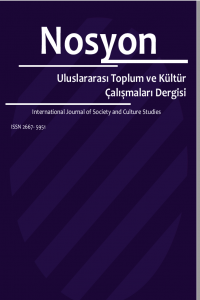Husserl Fenomenolojisinin İmkanı
Fenomenolojinin kurucusu olarak görülen Edmund Husserl kendi döneminin bilimsel gelişmelerine temel olabilecek bir felsefe ya da yöntemin temelini atmıştır. Makalenin ilk bölümünde Husserl’in ortaya attığı fenomenolojik yöntemin ortaya çıktığı felsefi arka plan tarihsel olarak gösterilmeye çalışılmıştır. İkinci bölümde ise naturalizm ve pozitivizm gibi 20.yüzyılın popüler düşünce akımlarındaki indirgemeci tutum ve dar empirik bilgi anlayışına karşı Husserl’in eleştirisi incelenmiştir. Fenomenolojik yöntemin detaylı bir sunumu yapıldıktan sonra Husserl’in Kant idealizminden kurtulma iddiasına Theodor W. Adorno tarafından yapılan eleştiri sunularak Husserl fenomenolojisinin Platon’un idealar düşüncesine çok benzer bir tablo sergilediği gösterilmiştir. Son bölümde ise Husserl fenomenolojisi epistemolojik bir analize tâbi tutulmuş ve Husserl’in fenomenolojik yöntem hipotezindeki varsayımsal temelin çok büyük olduğu gözlemlenmiştir. Bu varsayımlardaki çelişkiler ortaya konularak hipotezin epistemolojik ve ontolojik temelinin zayıflığı gösterilmeye çalışmış ve genel olarak varsayımsal önermelerin fazla olduğu sistem ya da yöntemlerin problemlerini Husserl’in fenomenolojik yönteminde de görmek mümkündür. Nihai olarak Husserl fenomenolojisinin imkanlı olduğu alanlar gösterilmeye çalışılmıştır. Bütün bilgi alanına temel olacak bir felsefenin kuruluşu iddiası ile yola çıkan Husserl, bilimin teorik ve pratik alanlarında uygulanması neredeyse imkansız bir yöntem ile felsefe dünyasına girmiştir. Bu çalışmada Husserl’in fenomenolojik yöntemi her bilgi alanına temel olmak yerine öznenin deneyiminin merkezde olduğu bazı bilimlerde kullanılarak salt duyu verilerine dayalı pozitivist bilimden daha başarılı sonuçlar verdiği iddia edilmiştir.
The possibility of Husserl’s phenomenology
Edmund Husserl, who is seen as the founder of phenomenology, laid the foundation of a philosophy or method that could be the basis for the scientific developments of his time. In the first part of this article, the historical and social context in which Husserl's phenomenological method emerged is shown. In the second part, Husserl's critique against the reductionist attitude and narrow empirical knowledge understanding in 20th century popular thought movements such as naturalism and positivism has been examined. After a detailed presentation of the phenomenological method, the criticism of Husserl's claim to get rid of Kant idealism was presented by Theodor W. Adorno and it was shown that Husserl's phenomenology exhibits a very similar picture to Plato's idea of ideas. In the last part, Husserl phenomenology was subjected to an epistemological analysis and it was observed that the hypothetical basis of the hypothesis was very large. By revealing the contradictions in these assumptions, the weakness of the epistemological and ontological basis of the hypothesis has been tried to be shown, and it is possible to see the problems of systems or methods in which hypothetical propositions are high in general in Husserl's phenomenological method. Finally, the areas where Husserl phenomenology is possible have been tried to be shown. Husserl, who set out with the claim of establishing a philosophy that will be the basis of the whole field of knowledge, entered the world of philosophy with a method that is almost impossible to apply in the theoretical and practical fields of science. In this study, it is claimed that Husserl's phenomenological method is used in some sciences where the experience of the subject is at the center instead of being the basis for every field of knowledge, and it gives more successful results than the positivist science based on pure sensory data.
___
- Adorno, T. W. (2020). Husserl ve İdealizm Problemi. G. Ateşoğlu (Dü.) içinde, Varoluşçuluk, Fenomenoloji, Ontoloji (E. T.Somyürek, K. Gülenç, & A. İ.Duru, Çev., s. 171-188). İstanbul: Ayrıntı Yayınları.
- Descartes. (2020). Yöntem Üzerine Konuşma. İstanbul: İş Bankası Kültür Yayınları.
- Fréchette, G. (2020). Brentano on Phenomenology and Philosophy as a Science. D. Fisette, & G. Fréchette içinde, Franz Brentano and Austrian Philosophy (s. 101-116) içinde. Wien: Vienne Circle Society.
- Giorgi, A. (1994). A phenomenological perspective on certain qualitative resarch methods. Journal of Phenomenological Psychology, 190-220.
- Giorgi, A. (2012). The descriptive phenomenological psychological method. Journal of Phenomenological , 3-12.
- Husserl, E. (2001). Logical investigations (First paperback edition; D. Moran, Ed.; J. N. Findlay, Çev.). London: Routledge, Taylor & Francis Group.
- Husserl, E. (2003). Fenomenoloji Üzerine Beş Ders. (H. Tepe, Çev.) Ankara: Bilim ve Sanat Yayınları.
- Husserl, E. (2008). Introduction to logic and theory of knowledge: Lectures 1906-07 (C. O. Hill, Çev.). Springer.
- Husserl, E. (2021). Kesin Bir Bilim Olarak Felsefe. (T. Mengüşoğlu, Çev.) İstanbul: Yapı Kredi Yayınları.
- Üner, A. (2014). Nedensellik İlkesi: Hume’a Karşı Kant. Mavi Atlas, 100-108.
- Kant, I. (1929). Critique of Pure Reason. Newyork: St Marin’s Press.
- Kearney, R. (1986). Modern Movements in European Philosophy. Manchester and Newyork: Manchester University Press.
- Küçükalp, K. (2008). Batı Metafiziğinin Dekonstrüksiyonu: Heidegger ve Derrida. İstanbul: Sentez Yayınları.
- Lyotard, J.-F. (2007). Fenomenoloji. (İ. Birkan, Çev.) Ankara: Dost Kitabevi Yayınları.
- Marcuse, H. (1965). On Science and Phenomenology. R. S.Cohen, & M. W.Wartofsky içinde, Boston Studies in the Philosophy of Science (s. 279-290). Newyork: Humanities Press.
- Mastermann, M. (2017). “Paradigmanın Doğası” Eleştiri ve Bilginin Gelişmesi. (İ. Lakatos, A. Musgrave, Dü, & N. Küçük, Çev.) İstanbul: İthaki Yayınları.
- Özlem, D. (2012). Bilim Felsefesi. İstanbul: Notos Kitap.
- Pietersma, H. (2000). Phenomenological epistemology. New York: Oxford Univ. Press.
- Poincaré, H. (2019). Bilim ve Hipotez. (F. Yücel, Çev.) Ankara: Fol Yayınları.
- Şan, E. (2010). Neden Hala Husserl? Baykuş, 14-29.
- Zahavi, D. (2019). Applied phenomenology: why it is safe to ignore the epoché. Continental Philosophy Review, 259-273.
